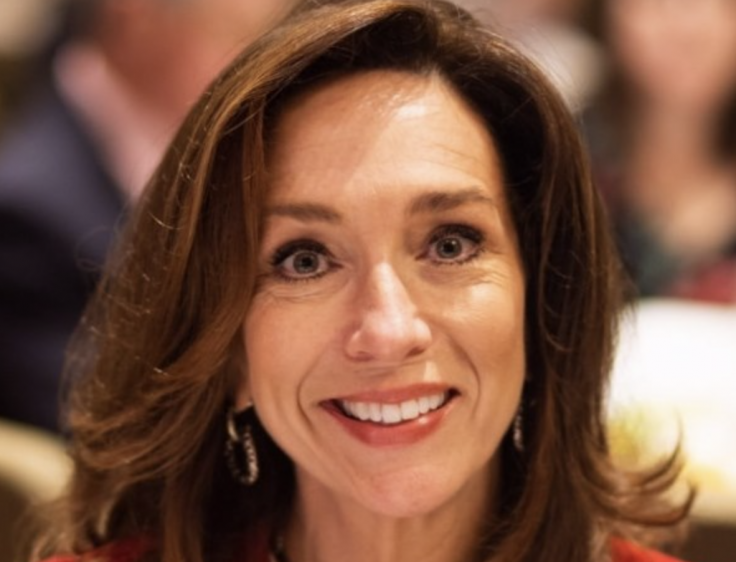ATLANTA—Democratic Senate candidate Teresa Tomlinson has a theory about why her party keeps losing in her state of Georgia: Democrats have never run "authentic" candidates in the past who can appeal to voters in its central and southern regions.
"Republicans have for now 20 years been able to run the tables in central and south Georgia, because we've never been able to run a candidate who is authentic and understands their lives and appreciates their life journey and understands their communities," Tomlinson told the Washington Free Beacon Wednesday after the Democratic presidential debate. "Well, the mayor of Columbus does, and someone whose family is from central and south Georgia does."
The campaign for the former two-term mayor of Columbus, Ga., told the Free Beacon she wasn't taking a shot at Stacey Abrams or other Democrats who have lost in Georgia, only that she was uniquely suited to thwart the "rural strategy" that carried Republican governor Brian Kemp to victory over Abrams in 2018. Tomlinson is seeking the 2020 nomination to challenge Sen. David Perdue (R., Ga.), a Donald Trump ally.
Tomlinson's remark comes on the heels of Abrams's closely followed bid last year to become the nation's first black, female governor. Tomlinson was also delayed in entering the race until May while Abrams publicly mulled running for Senate. However, Tomlinson's campaign said her comment about the party not running "authentic" candidates before was not a dig at Abrams.
"Of course not!" spokeswoman Nicole Henderson wrote in an emailed response, saying her point was she had "bona fides" by having lived and led outside metro Atlanta.
"Democrats do not normally run candidates from outside of metro Atlanta, which allows the Republicans to run their rural strategy by claiming the Democratic candidate does not have an authentic connection to their non-metro Atlanta life journey," she said. "Teresa's profile torpedoes that rural strategy. Her authentic profile relates to the non-metro Atlanta experience."
Abrams routed Kemp in Atlanta and its formerly Republican-leaning suburbs, but Kemp overwhelmed her in the rest of the state to win by 1.4 percentage points.
"If Teresa Tomlinson thinks she can win over central and south Georgia by campaigning on socialist policies like the Green New Deal that would raise taxes on working families, she's even more out-of-touch than we thought," John Burke of the pro-Perdue Georgia Action Fund told the Free Beacon.
Tomlinson is one of four Georgia Democrats bidding for the party's 2020 Senate nomination to face Perdue, and it hasn't been a smooth ride. Since its inception, the Tomlinson campaign has struggled with financing and controversy, including one high-profile departure.
Although she was the first to enter the race on May 1—announcing one day after Abrams declared she would not run—Tomlinson failed to clear the field with a second-quarter fundraising total of $520,000. Three other Democrats have entered the race to face Perdue since then.
"Of course, I spent the first month or month-and-a-half explaining Stacey Abrams was not running, as you may remember, so we were quite proud of that," Tomlinson said of the second-quarter haul.
She only raised $380,000 in the third quarter, leaving her with $1 million less in cash-on-hand than Democratic rival Jon Ossoff. That led in part to the stormy dismissal of her finance chair Edana Walker. Walker, who previously worked for Abrams's campaign, called Tomlinson "thoughtless and cruel" for asking her to find her own replacement on the way out.
Tomlinson's campaign manager Kendra Cotton also created controversy when she accused Ossoff last month of "co-opting" civil rights icon Rep. John Lewis (D., Ga.) and his endorsement. Ossoff lost Georgia's Sixth Congressional District race in 2017 and has never held office. Cotton, who is black, accused Ossoff of "trying to wear a black man’s narrative and work like a winter coat."
Tomlinson received criticism for her dealings with the black community in Columbus while in office from 2011 to 2019. Edward O. DuBose, who serves on the national NAACP board of directors, told Mother Jones that Tomlinson was at times "completely out of touch with the African-American community" in Columbus. Tomlinson pointed to her reelection in 2014, when she carried all her city's black precincts, as proof of her positive relationship with black voters, as well as a record of crime reduction and economic development.
Tomlinson is a former Republican who brands herself a "pragmatic progressive," rejecting the "socialist" label from Perdue as dirty politics. She favors expanding Obamacare to include a public option over instituting Medicare for All, telling the Free Beacon that eliminating private insurance would "shock the market." This professed pragmatism did not stop Tomlinson from criticizing voters who have chafed at the cost of the Green New Deal proposal, saying they should "stop complaining" since they are already bearing the burdens of climate change.
The 2020 Senate showdown is widely considered the most important Georgia political race since the gubernatorial election in 2018, a subject of lingering bitterness for state and national Democrats. Abrams still complains Kemp rigged the 2018 election in his favor through systematic voter suppression, claims which have been refuted by fact-checks from the Free Beacon, National Review, the Weekly Standard, the Washington Examiner, and others.
In spite of these thorough debunkings, top Democratic White House contenders have continued to claim Abrams should have won. Tomlinson gave a mixed response when asked if she felt Kemp was the legitimate governor.
"I think he won, I mean absolutely," she said. "I think people always knew there was a little bit of shenanigans going on, that maybe some counties, there was some foul play. But I don't think that we saw with exact match [laws], with the purging from the rolls, with the absentee ballots being discarded, I don't think we appreciated until 2018 how pervasive that was and how impactful it was."
